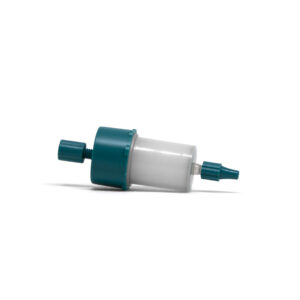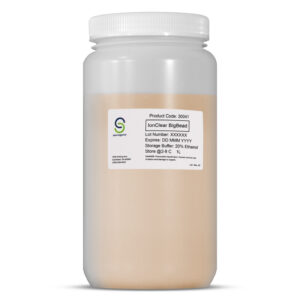Table 1. Resin Characteristics
| Bead Material
| Agarose |
| Bead Percentage
| 4% |
| Bead Size | 60-160 µm |
| Flow Rate1 | >30 mL/min (>680 cm/hr) @ 25oC |
| Binding Capacity (Endotoxin)
| >250,000 EU/mL |
| pH Stability2 | 2-14 |
| Storage Temperature | 2-8o C |
| Storage Buffer
| 20% Ethanol |
| Form | Slurry |
| Chemical Stability2 | Stable in all commonly used aqueous solutions and buffers. |
| Physical Stability2 | Negligible volume variation due to changes in pH or ionic strength. |
1Linear flow rate = volumetric flow rate (cm3/h)/column cross-sectional area (cm2)
2Data refer to the coupled product, provided that the ligand can withstand the pH or chemical environment. Please note the following: pH stability, long term refers to the pH interval where the medium is stable over a long period of time without adverse effects on its subsequent chromatographic performance. pH stability, short term refers to the pH interval for regeneration and cleaning procedures.
Instructions for Use
DNA Etox binds endotoxins with high affinity without significant trapping of DNA. DNA recovery is very high, while endotoxin levels are greatly reduced. DNA Etox is stable when depyrogenated with 1N NaOH for 2 hours at 37oC or overnight at room temperature.
Precautions:
1. Use only endotoxin-free water and buffers.
2. Use aseptic technique. Work in a laminar flow (tissue culture) hood and wash surfaces with 70% Ethanol. All tubing and pumps that come in contact with the product should be sanitized with 70% Ethanol or 1N NaOH and rinsed with endotoxin-free water.
Protocol:
1. Wash DNA Etox with ten bed volumes of 1N NaOH and keep the resin in 1N NaOH for two hours at 37oC or overnight at room temperature. Wash to neutral pH with pyrogen-free water. Filter the sample* with a 0.2 m filter to remove any microorganisms that may contaminate the sample and produce additional endotoxins.
2. Depyrogenate your sample using DNA Etox. The reaction between the resin and endotoxin is not instantaneous. If working in batch mode, a 20-minute incubation time is recommended; if running through a column, run at a maximum of 200 cm/hr and recirculate the sample for 20 minutes. Contact times and circulation rates may need to be optimized.
3. To regenerate the resin, wash DNA Etox with ten bed volumes of 1N NaOH and keep the resin in 1N NaOH for two hours at 37oC or overnight at room temperature. Wash with pyrogen-free water to neutral pH.
4. Store the sanitized DNA Etox in sterile, pyrogen-free water containing 20% ethanol at 2-8oC.
*When there are strong ionic interactions between samples and the charged residues on the inner core of the LPS molecule, it becomes necessary to raise the ionic strength of the sample, in some cases to 1M NaCl, to minimize this attraction. In these cases, equilibrate the column with sterile, pyrogen-free 1M NaCl.
For technical service, email info@sterogene.com or call (760) 929-0455.
To Download Instructions for use:
INST 2706 DNA Etox


